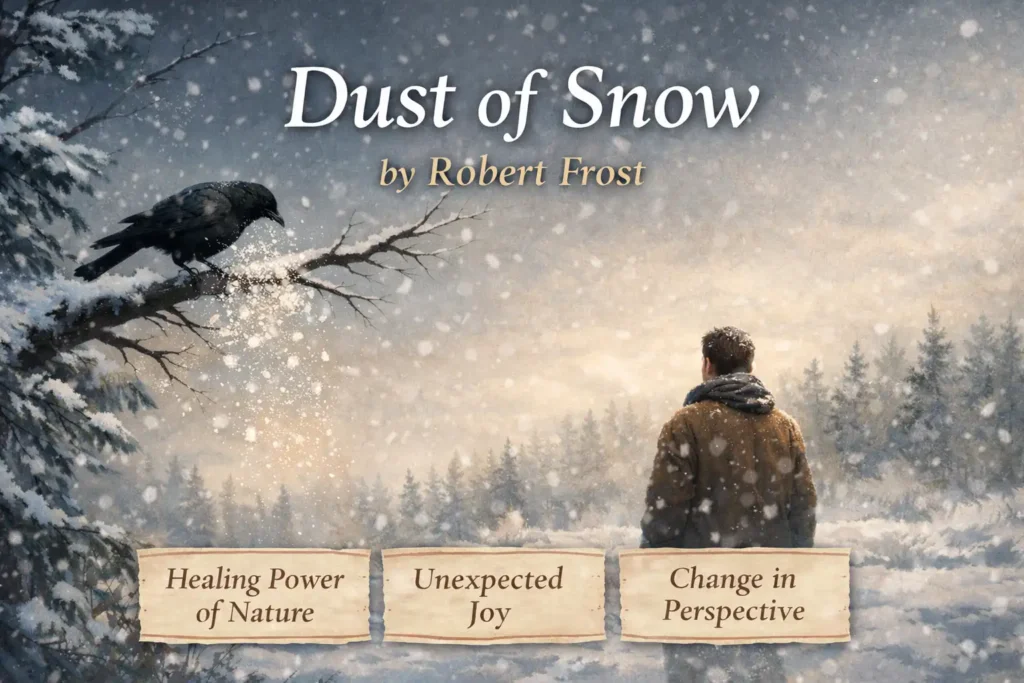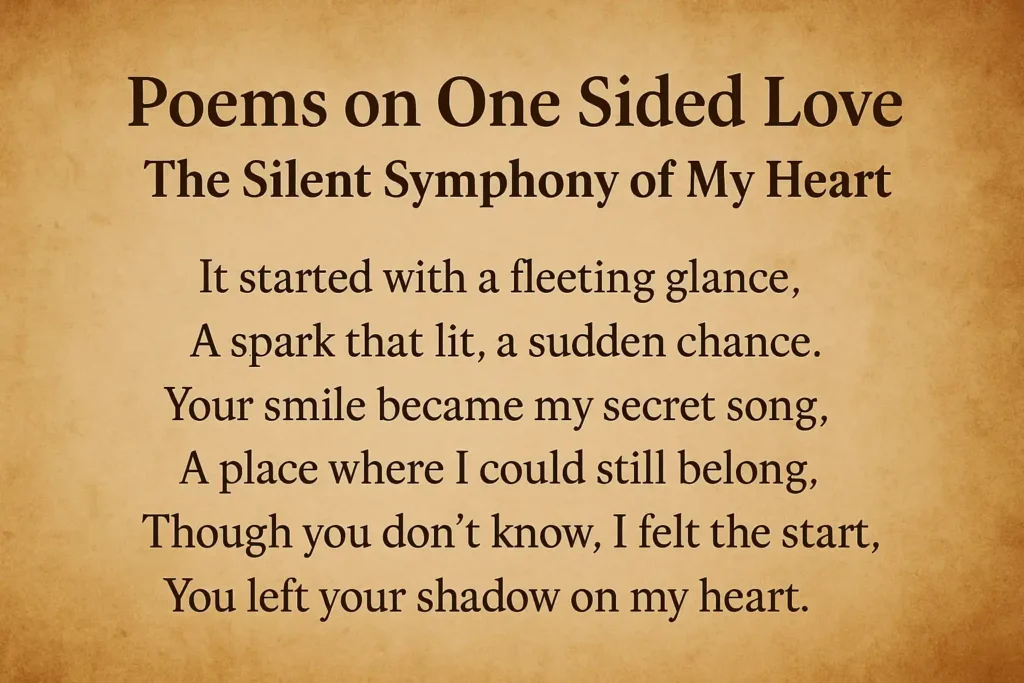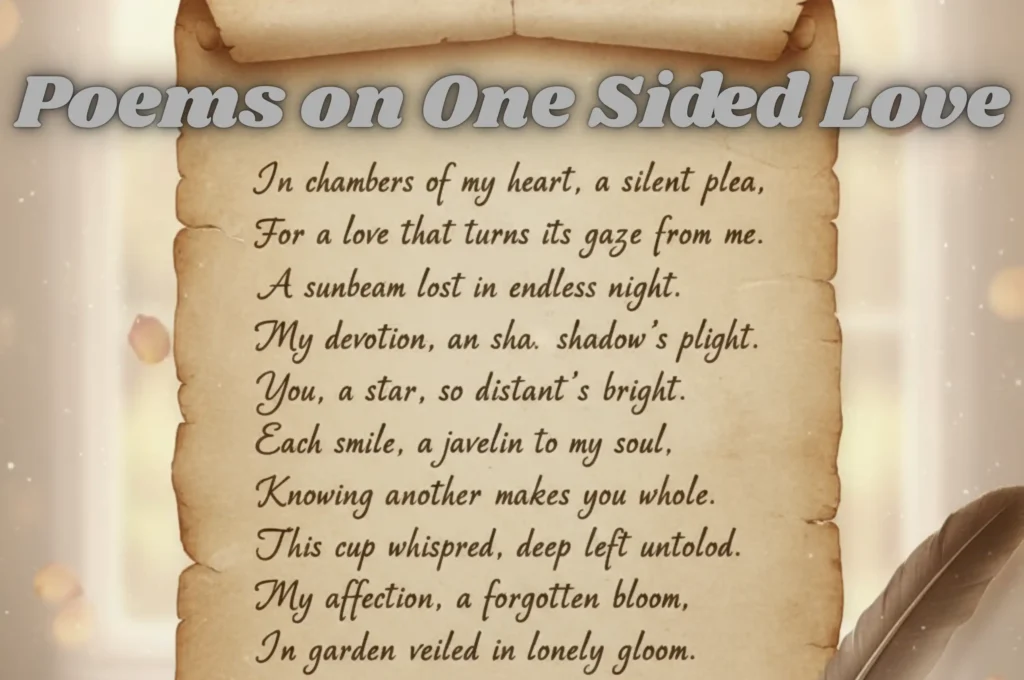Lenore by Edgar Allan Poe is a deeply emotional piece that explores themes of love, loss, and the afterlife. Unlike The Raven, which dwells on unending grief, Lenore presents a more defiant and uplifting perspective on death. The poem is structured as a dramatic dialogue, where the protagonist, Guy de Vere, refuses to mourn Lenore in traditional sorrow. Instead, he chooses to celebrate her ascent to heaven, highlighting the tension between worldly sorrow and spiritual transcendence.
Explore: Poets and Poetry Page | Famous Quotes by Edgar Allan Poe | Edgar Allan Poe Biography | Poems by Edgar Allan Poe |

Table of Contents
Lenore by Edgar Allan Poe
Ah, broken is the golden bowl! the spirit flown forever!
~ Lenore by Edgar Allan Poe
Let the bell toll!- a saintly soul floats on the Stygian river;
And, Guy de Vere, hast thou no tear?- weep now or nevermore!
See! on yon drear and rigid bier low lies thy love, Lenore!
Come! let the burial rite be read- the funeral song be sung!-
An anthem for the queenliest dead that ever died so young-
A dirge for her the doubly dead in that she died so young.
“Wretches! ye loved her for her wealth and hated her for her pride,
And when she fell in feeble health, ye blessed her- that she died!
How shall the ritual, then, be read?- the requiem how be sung
By you- by yours, the evil eye,- by yours, the slanderous tongue
That did to death the innocence that died, and died so young?”
Peccavimus; but rave not thus! and let a Sabbath song
Go up to God so solemnly the dead may feel no wrong.
The sweet Lenore hath “gone before,” with Hope, that flew beside,
Leaving thee wild for the dear child that should have been thy
bride.
For her, the fair and debonair, that now so lowly lies,
The life upon her yellow hair but not within her eyes
The life still there, upon her hair- the death upon her eyes.
“Avaunt! avaunt! from fiends below, the indignant ghost is riven-
From Hell unto a high estate far up within the Heaven-
From grief and groan, to a golden throne, beside the King of
Heaven!
Let no bell toll, then,- lest her soul, amid its hallowed mirth,
Should catch the note as it doth float up from the damned Earth!
And I!- to-night my heart is light!- no dirge will I upraise,
But waft the angel on her flight with a Paean of old days!”
Line-by-Line Meaning and Analysis of Lenore by Edgar Allan Poe
1st Stanza: Lenore by Edgar Allan Poe
Ah, broken is the golden bowl! the spirit flown forever!
~ Lenore by Edgar Allan Poe
Let the bell toll!- a saintly soul floats on the Stygian river;
And, Guy de Vere, hast thou no tear?- weep now or nevermore!
See! on yon drear and rigid bier low lies thy love, Lenore!
Come! let the burial rite be read- the funeral song be sung!-
An anthem for the queenliest dead that ever died so young-
A dirge for her the doubly dead in that she died so young.
This stanza sets the tone of deep sorrow, mourning, and a critique of those who failed to appreciate Lenore in life.
“Ah, broken is the golden bowl! the spirit flown forever!”
The “golden bowl” symbolizes life, likely referring to Lenore’s soul or essence. Its breaking signifies her death, emphasizing the finality of her passing. “The spirit flown forever” suggests her soul has departed permanently, reinforcing the sense of irretrievable loss.
“Let the bell toll!- a saintly soul floats on the Stygian river;”
The tolling of the bell marks the solemnity of death. The “saintly soul” refers to Lenore, implying her purity and virtue in life. The “Stygian river” alludes to the River Styx from Greek mythology, which separates the world of the living from the underworld, symbolizing her journey into the afterlife.
“And, Guy de Vere, hast thou no tear?- weep now or nevermore!”
The speaker addresses Guy de Vere, Lenore’s lover, questioning why he does not mourn her death. The phrase “weep now or nevermore” is urgent, emphasizing that this is his last chance to grieve, or else he will have lost the opportunity forever.
“See! on yon drear and rigid bier low lies thy love, Lenore!”
The speaker points to Lenore’s lifeless body resting on a bier (a platform for a corpse before burial). “Drear and rigid” emphasize the coldness and lifelessness of death, contrasting with the love and vitality she once had.
“Come! let the burial rite be read- the funeral song be sung!-“
This line invites those present to perform the final rites for Lenore, calling for prayers and hymns to send her soul to the afterlife.
“An anthem for the queenliest dead that ever died so young-“
Lenore is described as “queenliest,” suggesting she was regal in her beauty, virtue, or presence. Her untimely death is lamented, making her loss even more tragic.
“A dirge for her the doubly dead in that she died so young.”
A “dirge” is a mournful funeral song. The phrase “doubly dead” intensifies the tragedy—perhaps implying that her death was not just physical but also emotional or spiritual, especially given her youth. It underscores the unfairness of her premature demise.
2nd Stanza: Lenore by Edgar Allan Poe
“Wretches! ye loved her for her wealth and hated her for her pride,
~ Lenore by Edgar Allan Poe
And when she fell in feeble health, ye blessed her- that she died!
How shall the ritual, then, be read?- the requiem how be sung
By you- by yours, the evil eye,- by yours, the slanderous tongue
That did to death the innocence that died, and died so young?”
This stanza serves as a harsh rebuke to the false mourners, portraying them as villains responsible for Lenore’s suffering.
“Wretches! ye loved her for her wealth and hated her for her pride,”
The speaker accuses the mourners of hypocrisy. They only cared for Lenore because of her wealth but despised her pride, possibly her dignity or independence. This suggests that those who pretend to mourn her now had ulterior motives while she was alive.
“And when she fell in feeble health, ye blessed her- that she died!”
The mourners are further condemned for their cruelty. Instead of showing compassion when Lenore became ill, they were relieved by her death, as if it was a blessing rather than a tragedy. This line emphasizes their selfishness and lack of genuine sorrow.
“How shall the ritual, then, be read?- the requiem how be sung”
The speaker questions how these same people, who wronged Lenore in life, can now participate in her funeral rites with sincerity. A requiem is a mass or hymn for the dead, and the speaker challenges their right to mourn someone they mistreated.
“By you- by yours, the evil eye,- by yours, the slanderous tongue”
The accusations intensify as the speaker directly blames the mourners for their malicious actions. The “evil eye” suggests jealousy or ill will, while the “slanderous tongue” refers to gossip and lies that might have harmed Lenore’s reputation.
“That did to death the innocence that died, and died so young?”
The repetition of “died” underscores the tragic and unjust nature of Lenore’s death. The speaker suggests that Lenore was not only physically killed but also metaphorically destroyed by the cruelty and judgment of those around her. The emphasis on her youth further amplifies the sorrow of her untimely death.
3rd Stanza: Lenore by Edgar Allan Poe
Peccavimus; but rave not thus! and let a Sabbath song
~ Lenore by Edgar Allan Poe
Go up to God so solemnly the dead may feel no wrong.
The sweet Lenore hath “gone before,” with Hope, that flew beside,
Leaving thee wild for the dear child that should have been thy
bride.
For her, the fair and debonair, that now so lowly lies,
The life upon her yellow hair but not within her eyes
The life still there, upon her hair- the death upon her eyes.
This stanza shifts from anger to mourning, acknowledging grief while also attempting to find solace in the idea that Lenore has moved on to a better existence.
“Peccavimus; but rave not thus! and let a Sabbath song”
“Peccavimus” is Latin for “We have sinned.” The mourners acknowledge their wrongdoings but ask the speaker not to continue his angry accusations. Instead, they suggest singing a solemn Sabbath hymn to honor Lenore.
“Go up to God so solemnly the dead may feel no wrong.”
The mourners want a sacred and respectful tribute to Lenore, hoping that the ceremony will bring peace to her soul and not disturb her rest.
“The sweet Lenore hath ‘gone before,’ with Hope, that flew beside,”
Lenore has passed away, but she is not alone—she is accompanied by Hope, personified as a guiding force leading her into the afterlife. This line suggests that Lenore is in a better place, possibly heaven.
“Leaving thee wild for the dear child that should have been thy bride.”
This line addresses Guy de Vere, who is heartbroken over Lenore’s death. She was supposed to be his bride, but now he is left alone and tormented by grief.
“For her, the fair and debonair, that now so lowly lies,”
Lenore, once beautiful and full of life, now lies in death. “Fair and debonair” highlights her charm and elegance, while “lowly lies” emphasizes the contrast between her past vibrancy and her current stillness in the grave.
“The life upon her yellow hair but not within her eyes”
Though her golden hair still shines as if full of life, her eyes—once full of expression—now hold only death. This contrast between her hair and her eyes highlights the tragic reality of her passing.
“The life still there, upon her hair- the death upon her eyes.”
This repetition reinforces the striking image of Lenore’s lifeless body. The beauty of her hair remains, but her eyes—once windows to her soul—are now empty and lifeless, symbolizing her final departure from the world.
4th Stanza: Lenore by Edgar Allan Poe
“Avaunt! avaunt! from fiends below, the indignant ghost is riven-
~ Lenore by Edgar Allan Poe
From Hell unto a high estate far up within the Heaven-
From grief and groan, to a golden throne, beside the King of
Heaven!
Let no bell toll, then,- lest her soul, amid its hallowed mirth,
Should catch the note as it doth float up from the damned Earth!
And I!- to-night my heart is light!- no dirge will I upraise,
But waft the angel on her flight with a Paean of old days!”
The final stanza rejects traditional mourning and instead celebrates Lenore’s exaltation to Heaven. The speaker insists that she is not to be pitied but revered, and he refuses to engage in sorrowful rituals. Instead, he chooses to send her off with a song of triumph, reinforcing the theme of transcendence and divine justice.
“Avaunt! avaunt! from fiends below, the indignant ghost is riven—”
“Avaunt!” means begone! The speaker forcefully rejects any notion that Lenore’s soul is trapped in suffering. Her indignant spirit has been riven (torn away) from the clutches of fiends below, meaning she has been freed from any association with Hell.
“From Hell unto a high estate far up within the Heaven—”
Lenore’s soul has not descended into Hell but instead has ascended to a high and noble position in Heaven. This challenges the mourners’ previous implication that she may have suffered due to earthly sins.
“From grief and groan, to a golden throne, beside the King of Heaven!”
She has transcended the pain of life (“grief and groan”) and now sits on a “golden throne” next to God, suggesting that she has been rewarded in the afterlife for her virtue.
“Let no bell toll, then,- lest her soul, amid its hallowed mirth,”
The speaker forbids any funeral bells from tolling. He believes Lenore’s soul is now experiencing “hallowed mirth” (sacred joy) in Heaven, and hearing the mournful tolling might disturb her peace.
“Should catch the note as it doth float up from the damned Earth!”
If the bells ring, their sorrowful sound may reach Lenore in Heaven, reminding her of the suffering and corruption of the mortal world—something the speaker wishes to avoid.
“And I!- to-night my heart is light!- no dirge will I upraise,”
Unlike traditional mourners who lament the dead, the speaker refuses to sing a dirge (a funeral lament). Instead, he feels a sense of lightness, likely because he believes Lenore is in a better place.
“But waft the angel on her flight with a Paean of old days!”
Instead of a sorrowful dirge, he will sing a Paean—a song of triumph and joy—to celebrate Lenore’s ascension to Heaven. This suggests that her death should not be mourned but honored as a passage to eternal glory.
Summary of Lenore by Edgar Allan Poe
Lenore is a poetic dialogue that explores the nature of mourning and remembrance. While the mourners engage in conventional grief, Guy de Vere denounces their hypocrisy and instead celebrates Lenore’s spiritual triumph. The poem contrasts earthly sorrow with heavenly joy, ultimately advocating for a perspective that embraces the afterlife rather than lamenting death.
Themes in Lenore by Edgar Allan Poe
- Death and the Afterlife: Poe presents death as a transition rather than an end, focusing on Lenore’s ascent to heaven.
- Hypocrisy in Mourning: The poem critiques false sorrow, suggesting that those who mistreated Lenore in life have no right to grieve her now.
- Love and Devotion: Guy de Vere’s love is unwavering, choosing to honor Lenore with joy rather than sorrow.
- Spiritual Triumph: The poem suggests that true peace comes not from mourning but from recognizing the deceased’s elevation to a higher state.
Conclusion – Lenore by Edgar Allan Poe
What do you think about the way Lenore presents grief? Do you agree with Guy de Vere’s defiant approach to mourning, or do you believe traditional sorrow has its place? Poe’s poem challenges us to reflect on how we remember the dead—do we dwell on loss, or do we celebrate the life they lived? Share your thoughts!
Explore our Literature YouTube Channels:

YouTube Channel Link:

YouTube Channel Link:

YouTube Channel Link:

YouTube Channel Link



















